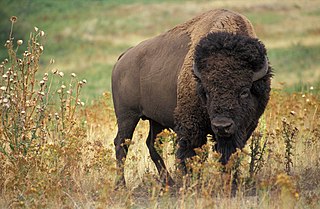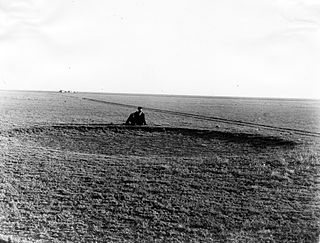
Bison are large, even-toed ungulates in the genus Bison within the subfamily Bovinae.

The American bison or simply bison, also commonly known as the American buffalo or simply buffalo, is an American species of bison that once roamed North America in vast herds. Its historical range, by 9000 BCE, is described as the great bison belt, a tract of rich grassland that ran from Alaska to the Gulf of Mexico, east to the Atlantic Seaboard as far north as New York and south to Georgia and, according to some sources, down to Florida, with sightings in North Carolina near Buffalo Ford on the Catawba River as late as 1750. It nearly became extinct by a combination of commercial hunting and slaughter in the 19th century and introduction of bovine diseases from domestic cattle. With a population in excess of 60 million in the late 18th century, the species was down to 541 animals by 1889. Recovery efforts expanded in the mid-20th century, with a resurgence to roughly 31,000 animals today, largely restricted to a few national parks and reserves. Through multiple reintroductions, the species is now also freely roaming wild in some regions in Yakutia as well as Mexico.

The water buffalo or domestic water buffalo is a large bovid originating in the Indian subcontinent, Southeast Asia, and China. Today, it is also found in Europe, Australia, North America, South America and some African countries. The wild water buffalo native to Southeast Asia is considered a different species, but most likely represents the ancestor of the domestic water buffalo.

The carabao is a domestic swamp-type water buffalo native to the Philippines. Despite the popular notion that this bovine has been declared as the national animal of the Philippines, the National Commission for Culture and the Arts of the Philippines has stated that this is not the case as it has no basis in Philippine law.

The African helmeted turtle, also known commonly as the marsh terrapin, the crocodile turtle, or in the pet trade as the African side-necked turtle, is a species of omnivorous side-necked terrapin in the family Pelomedusidae. The species naturally occurs in fresh and stagnant water bodies throughout much of Sub-Saharan Africa, and in southern Yemen.

The Military Order of the Carabao is a social club open to officers of the U.S. military and war correspondents who served in the Philippines or on overseas official military campaigns. The order was initially created to satirize the pompous and pretentious Military Order of the Dragon. Descendants of those eligible for membership are themselves eligible, regardless of military service. As of 2016 the annual dues were US$50.

William "Billy" Dixon was an American scout and buffalo hunter active in the Texas Panhandle. He helped found Adobe Walls, fired a legendary buffalo rifle shot at the Second Battle of Adobe Walls, and for his actions at the "Buffalo Wallow Fight" became one of eight civilians ever to receive the U.S. Medal of Honor.

Bear Wallow is an unincorporated crossroads village in Washington County, Kentucky, United States. It lies at the intersection of roads from Bardstown, Cisselville, Fredericktown, Manton, and McIntyre.

Buffalo Trace Distillery is a distillery in Frankfort, Kentucky, that is owned by the Sazerac Company. It has historically been known by several names, including the George T. Stagg Distillery and the Old Fire Copper (O.F.C.) Distillery. Its namesake bourbon brand, Buffalo Trace Kentucky Straight Bourbon whiskey, was introduced in August 1999. The company claims the distillery is the oldest continuously-operating distillery in the United States. The company says the name "Buffalo Trace" refers to an ancient buffalo crossing on the banks of the Kentucky River in Franklin County, Kentucky. The Sazerac Company purchased the distillery in 1992.
The buffalo is the second animal symbol in the 12-year cycle of the Vietnamese zodiac, taking the place of the Ox in the Chinese zodiac. Water buffalo are industrious and patient. In general, the year is slow and steady, appropriate for scientists. The hours of the buffalo are from 1 to 3 am.

The Vincennes Trace was a major trackway running through what are now the American states of Kentucky, Indiana, and Illinois. Originally formed by millions of migrating bison, the Trace crossed the Ohio River near the Falls of the Ohio and continued northwest to the Wabash River, near present-day Vincennes, before it crossed to what became known as Illinois. This buffalo migration route, often 12 to 20 feet wide in places, was well known and used by American Indians. Later European traders and American settlers learned of it, and many used it as an early land route to travel west into Indiana and Illinois. It is considered the most important of the traces to the Illinois country.
Bear Wallow or Bearwallow may refer to:

A buffalo wallow or bison wallow is a natural topographical depression in the flat prairie land that holds rain water and runoff.

Bear Wallow is an unincorporated community in Barren County, Kentucky, United States.
Amos Chapman (1839–1925) was a civilian scout who was awarded the Medal of Honor for gallantry while in service of the United States Army during the Indian Wars. His medal was later revoked before he died as he was a civilian, but was reinstated in 1989. He was of mixed white and Native American ancestry, and married Mary Longneck, a Cheyenne woman, maintaining Native American customs throughout his life. In 2012, he was inducted into the Oklahoma Military Hall of Fame.

Paleontology in Kentucky refers to paleontological research occurring within or conducted by people from the U.S. state of Kentucky. Kentucky's abundance of exposed sedimentary rock makes it an ideal source of fossils. The oldest exposed rocks in Kentucky are of Ordovician age. The geologic column of Kentucky also contains rocks deposited during the ensuing periods until the end of the Pennsylvanian. During this span of time the state was first home to a warm shallow sea home to an abundance and variety of brachiopods, cephalopods, crinoids, and trilobites. During the Devonian, a large reef system formed at what is now the Falls of the Ohio. Swamps covered Kentucky during the ensuing Carboniferous period. Then a gap spans from the start of the Permian to the Pleistocene, although the gap is interrupted by minor deposits of Cretaceous and Eocene rocks. These deposits mainly preserve plant fossils. Ice Age Kentucky was home to short-faced bear, bison, elk, lions, mammoths, mastodons, and giant ground sloths. Local Native Americans interpreted fossils of this age at Big Bone Lick as belonging to ancient monsters killed by benevolent mystical little people. This same fossil deposit would attract attention from major American figures like George Washington, Daniel Boone, and, especially, Thomas Jefferson. Amateur fossil collectors should be aware that they need permission from landowners to prospect legally on private property. Brachiopods are the Kentucky state fossil.

Bear Wallow is an unincorporated community and coal town in Morgan County, Kentucky, United States.
Bear Wallow, Kentucky may refer to:
Wallowing in animals is a comfort behaviour during which an animal rolls its body about in mud, water or snow. Some definitions include rolling about in dust, however, in ethology this is usually referred to as dust bathing. Wallowing is often combined with other behaviours to fulfil its purpose; for example, elephants will often blow dirt over themselves after wallowing to create a thicker "coating", or pigs will allow the mud to dry before rubbing themselves on a tree or rock to remove ectoparasites stuck in the mud.

Hog Wallow is an unincorporated community in Meade County, Kentucky, United States.













